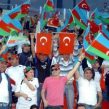
Turkish-Azeri Talks on Gas Prices Continue through “Soccer Diplomacy”
Publication: Eurasia Daily Monitor Volume: 6 Issue: 107
By:

Turkish Energy and Natural Resources Minister Taner Yildiz discussed energy issues with Azeri officials on the sidelines of a recent soccer game. Following his talks, Yildiz commented on the status of the Turkish-Azeri talks on pricing gas imports and Turkey’s position on the Nabucco project. The incident echoes what was referred to as the "soccer diplomacy" conducted last year between Turkey and Armenia.
The Turkish and Azeri national soccer teams played a friendly game in Turkey’s central Anatolian city of Kayseri on June 2. There was huge public interest and over 30,000 spectators decorated the stadium with the Turkish and Azeri flags. They carried placards and chanted slogans reflecting the sense of solidarity between the two nations: "We are all Azeris," "Karabakh belongs to Turks," "We cannot be divided" (www.nethaber.com, www.tumspor.com, June 2).
The sporting fixture also provided an additional venue to discuss contentious bilateral issues. The president of the Azerbaijani state petroleum company (SOCAR) Rovnag Abdullayev (also the head of the Azeri soccer federation), was in the audience. He watched the game alongside the head of the Turkish soccer federation and Yildiz. On the periphery of this event, Yildiz and Abdullayev continued their talks on pricing Turkey’s gas imports from Azerbaijan. Abdullayev flew back to Baku together with the Turkish ambassador to Azerbaijan in the same private jet (Hurriyet, June 3).
Yildiz told reporters that both sides shared their views as well as new proposals on pricing. He added that the Azeri side will respond after further evaluating the Turkish proposals. Although Yildiz found Azerbaijan’s request for further deliberation quite natural as part of the negotiation process, he also stressed his hope that it might be accelerated. "It will be in both countries’ interest to reach a solution as soon as possible. Over the next week, technical delegations will continue their work on the [mutual] proposals. My opinion is that without losing further time, an agreement on Shahdeniz-I and Shahdeniz-II should be reached. Our Azeri brothers said they would help us on this issue" (Anadolu Ajansi, June 3).
Abdullayev offered reassurance that no difficult issues existed between the two countries, but he said that there was no reason to rush into the project. He added "a thirty-year agreement and other issues cannot be resolved in one or two days. The game provided an opportunity to discuss these, but commercial matters cannot be concluded in haste… We received Turkey’s proposals on oil and gas and we will study them" (Milliyet, June 4).
Currently there are two major elements on the agenda of the Turkish-Azeri gas talks. Azerbaijan expects Turkey to revise gas import prices. Moreover, anxious to transport its gas to European markets, Baku wants Ankara to adopt a more cooperative position on the Nabucco project.
Under the terms of an agreement in 2001, Turkey annually imports 6 billion cubic meters (bcm) of gas from Azerbaijan’s Shahdeniz-I site at a price of $120 per thousand cubic meters, which is far below current global energy prices. Turkey also plans to purchase 8 bcm of gas from the Shahdeniz-II for its domestic consumption. Since the 2001 agreement ended in April 2008, Turkey has continued to import Azeri gas at the old price. In recent months, Baku has demanded the revision of the price to reflect the current market value, although Ankara has reportedly been unenthusiastic (EDM, May 1).
During his trip to Azerbaijan in May, Turkish Prime Minister Recep Tayyip Erdogan promised that a new and "fair" price will be found (EDM, May 14). Yildiz, who accompanied Erdogan to Baku, later said that "the price [offered] was as fair as possible… I cannot give a figure. But it is not as high as [the price for] the Russian gas. We are trying to agree on a price that is not completely disconnected from world markets and one that will satisfy both us and our Azeri brothers" (Hurriyet, May 16). However, the fact that a final decision has not been reached, shows that Turkey’s price offer did not necessarily satisfy the Azeri side, and they preferred to continue the talks until a "fair" price is agreed.
During his contacts in Kayseri earlier the same day, Yildiz commented on the future of the Nabucco project. Turkey has been viewed as the main obstacle to the conclusion of the intergovernmental transit agreement for the Nabucco pipeline, yet recent remarks emerging from Ankara has raised hopes for ending the stalemate (EDM, May 15, June 1). Yildiz reiterated Erdogan’s earlier optimism for signing the intergovernmental agreement in June, but added that the continuation of the negotiations indicated that a consensus on the exact date had not been reached (www.ntvmsnbc.com, June 3).
Yildiz was asked about the Nabucco Managing Director Reinhard Mitschek’s earlier comments that Turkey’s demand for "the 15 percent out-take is not on the table" (Reuters, May 29). In response, Yildiz insisted that Turkey’s demand was still under consideration. After noting that lively bargaining was occurring, he maintained that the Europeans appreciated Turkish concerns. "They are not completely indifferent to 15 percent. The real problem is about its modality… It might be possible to exclude it from the intergovernmental agreement, and then regulate it under another agreement" (Cihan Haber Ajansi, June 3).
This is not the first time that European and Turkish officials have issued contradictory statements on the Turkish position on the 15 percent issue (EDM, April 20). Ankara appears determined to get the best deal out of the Nabucco negotiations, even at the risk of further stalling the project and perhaps undermining Azerbaijan’s interests. For its own part, Baku also shows that it does not want the "brotherhood" to eclipse the country’s commercial interests, and will continue negotiations until a "fair" deal is finally secured.




